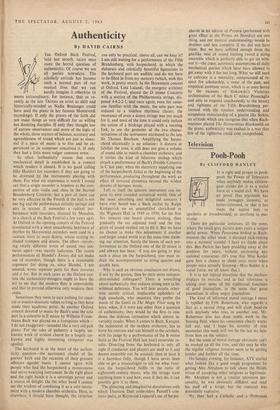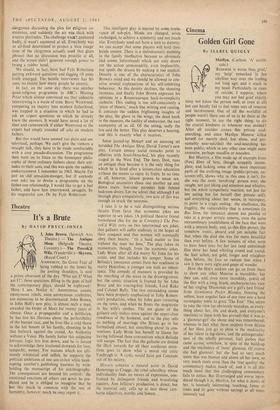Television
Pooh-Pooh
By CLIFFORD HANLEY
IT is right and proper to pooh- pooh the Power of Television when anybody makes extrava- gant claims for it as a social force or a social evil. We have no proof that television has made teenagers immoral, or better-informed, or that it has made the nation lazy or apathetic or broadminded, or anything in par, ticular.
There are particular instances, all the same, where the small grey picture does exert a unique social power. When Panorama looked at Rach- manism the other week, it elevated rack-renting into a national scandal. I have no doubt about this. Ben Parkin has been prodding away at the problem for years, without awakening any national conscience. (It's true that Miss Keeler gave him a chance to shout once more when people were actually listening—Miss Keeler is a social force, we all know that.) It is in hot topical situations that the medium displays its muscles, and in fact television is taking over some of the traditional functions of good journalism, in the sense that good journalism is often angry journalism.
The kind of informed moral outrage I mean is typified by Fyfe Robertson, who regards a fact as a sacred thing and will clash head-on with anybody who tries to smother one. Mr. Robertson also has .done noble work in the housing field, where his conscience clearly works full out, and I hope his scrutiny of rent anomalies this week will not be the last we hear from him on the subject.
But the sense of moral outrage obviously can't be worked up all the time, and this may be why the regular religious features seem to be getting feebler and feebler all the time.
On Sunday evening, for instance, ATV started what looked like a good tough programme by getting Abu Abraham to talk about the Hindu virtue of accepting other religions as legitimate. Mr. Abraham is not a routine television per- sonality, he was obviously diffident and read his stuff off a script; but the material was potentially explosive.
We then had a Catholic and a Protestant clergyman discussing the plea for religious co- existence, and suddenly the air was thick with evasive platitudes. The challenge waeiet answered badly, it wasn't answered at all. Everybody was so all-fired determined to project a 'nice image' (one of the clergymen actually used that glum phrase) that no discussion was possible at all, and the screen didn't generate enough power to twang a rubber band.
We should, in fact, have had Fyfe Robertson putting awkward questions and digging till some truth emerged. The hostile interviewer has his uses, no matter how many people he annoys.
In fact, on the same day there was another quasi-religious programme in ABC's Meeting Point which almost convinced me that unhostile interviewing is a waste of time. Barry Westwood, compering an inquiry into modern fatherhood, was trapped in a situation in which he had to ask an expert questions to which he already knew the answers. It would have saved a lot of time and camerawork if either Westwood or the expert had simply sounded off solo on modern fathers.
But this would have seemed too plain and un- tclevisual, perhaps. We can't give the viewers a straight talk, they have to be made comfortable with a cosy pseudo-discussion. The programme then went on to listen to the homespun philo- sophy of three ordinary fathers about their atti- tudes to their sons, and this was quite the saddest embarrassment I remember in 1963. Maybe I'm just an old sensation-monger, but if anybody ever asks me to devise a programme on the father-son relationship, I would like to get a bad father, and have him interviewed, savagely, by his ungrateful son. Or by Fyfe Robertson.































 Previous page
Previous page